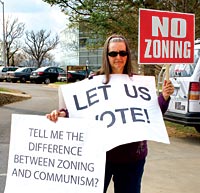It was a night of hisses and cheers, of impassioned statements and more than a few mumbled expletives. But hours of public comment at the Buncombe County Board of Commissioners’ April 24 meeting—mostly opposing the measure—did not deter the board from adopting a countywide zoning ordinance.

The vote was close. Commissioners David Gantt, David Young and Carol Peterson voted for zoning; Board Chairman Nathan Ramsey and Commissioner Bill Stanley voted against it. A second reading, required because the vote was not unanimous, is slated for May 1.
Defending his decision, Young called the zoning ordinance “another tool in the toolbox” for controlling sprawl and bringing orderly growth to the county.
But Ramsey, who was elected board chairman in 2000 on an antizoning platform, called the ordinance “a mistake,” saying it is “folly” to believe that the present minimal zoning rules won’t lead to more stringent controls on development.
A capacity crowd packed A-B Tech’s 700-seat Ferguson Auditorium, with latecomers trailing out the door. More than 100 county residents voiced their opinions during the meeting; only one in 10 spoke in favor of the zoning plan, and several of those had reservations.
Swannanoa resident Dee Dee Stiles said: “What’s happening to the mountains is not OK. Although I don’t believe in everything in the zoning plan, I do believe it’s a place to start.”
Bill Jakobi said that while he understood the crowd’s reservations about the ordinance, county residents need to “look beyond the end of their nose. We’ve got to imagine what this county will be like 20 years down the road.”

The ordinance establishes nine regulated land uses—including residential, commercial, public service and industrial activities—within the county’s Metropolitan Sewerage District and along major roads. The remaining 81 percent of the county that’s not in federal or state hands will be classified an “open use district,” in which only a few high-impact activities such as mines, chip mills and asphalt plants are prohibited. The ordinance also incorporates restrictions on multifamily developments at high elevations and creates Blue Ridge Parkway and Biltmore Estate overlay districts, which have more stringent rules to preserve those areas’ natural and historical values.
Pending final approval of the ordinance, Buncombe remains one of only 24 counties in the state without comprehensive zoning regulations. Yet the county first dabbled in zoning as far back as 1982, when it approved voluntary, community-based regulations for Limestone Township, south of Asheville. The new countywide rules are based on those. But longtime Board of Commissioners critic Don Yelton argued that the Limestone zoning experiment has been a failure.
“Which area has been zoned the longest? South Buncombe,” he said. “Where are the most adult bookstores? South Buncombe. Where is the worst traffic congestion? South Buncombe.”
Many other zoning opponents also believe it will do little to moderate growth in the county. Instead, they think it will strip away property rights and reduce options for affordable housing. The ordinance, they note, prohibits mobile homes from the new R-1 and R-2 districts.
“If we ban modular homes from a large area [of the county], there are more and more people who won’t be able to afford housing,” predicted Tom Christ, representing the Western Chapter of the North Carolina Manufactured Housing Association. “Everyone deserves the right to affordable housing, and we’re about the only option left.”
The commissioners assured the crowd that they will amend the rules within the next 60 days to make them more friendly toward mobile homes.
In a 1999 nonbinding referendum on countywide zoning, 55 percent of those who voted opposed zoning. But the turnout was extremely low, and the results were inconclusive in terms of gauging county residents’ wishes. Again and again, speakers at Tuesday’s meeting asked the commissioners for another public vote on zoning, but they were rebuffed.
“It’s a shame that we have to beg to have a vote,” lamented Kathy Rhodarmer of Candler.
“We gave you a chance in November of 2006,” said Ramsey, apparently addressing his colleagues on the board who rejected his proposal for another referendum on zoning.
What came across clearly at Tuesday’s meeting was a growing sense of frustration among county residents who feel their ability to live here with a measure of financial comfort, to retain family property, and to pursue their livelihoods is threatened by soaring property values, rising taxes and a speculative real-estate market. Many painted a bleak future for working people in Buncombe County, as well as for open space and farmland.
But zoning proponent Rebecca Williams of Swannanoa maintained that the cost of living in Buncombe County is going up not because of government meddling or onerous rules but rather “because of greed.”
And despite his philosophical differences with Williams, zoning opponent Brad Jones, manager of Country Squire Homes, a manufactured-home dealership in Swannanoa, delivered a similar message: “It seems to me that if someone builds a $1 million home next to your trailer, your taxes are going to go up. In my 39 years in this community, I’ve seen this place change drastically. And it’s only going to get worse.”


Zoning? No Zoning?
There is only one overriding question.
What can each of do to ensure that our beloved mountains are as close to the same 20 years from now as they are today?
Everyone’s property is made ‘better’ (more valuable & livable & beautiful) by limiting steep slope development, protecting our natural resources, promoting public transportation, rewarding the production of more efficient modes of transportation and the use of cleaner fuels, conservation, better schools & hospitals & museums & art galeries & nature trails & parks & unobstructed views of our undeveloped mountains & rivers & forests.
Buncombe County will double in population within 20 years…..with or without sane choices. The only question is….will the Buncombe County of 2027 be beautiful, healthy & livable……or look like the ugliness that has become Orlando & Charlotte & Atlanta?
People who want to live in places of unlimited destructive urban sprawl have many choices. People who wish to live in the natural splendor of the lands within 100 miles of our beloved Asheville have only ONE.